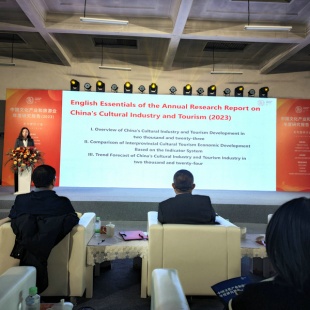Report spotlighting China's cultural tourism industry released in Beijing


From the BBQ craze in the old industrial city of Zibo in Shandong to the village soccer league frenzy in the obscure county Rongjiang in Guizhou to the ice and snow mania turning Harbin in Heilongjiang into the hottest winter destination — 2023 witnessed an explosive revival of China’s cultural tourism industry, spawning a host of phenomena online and offline.
Those phenomena are featured in The Annual Research Report on China’s Cultural Industry and Tourism (2023), published on Sunday in Beijing by Jinghe Institute of Culture and Tourism, a think tank specializing in China’s culture and tourism industries.
The 2023 report marks the institute’s third endeavor to shine a light on the country’s recent development in culture and tourism for relevant stakeholders.
The report launched the Jinghe Cultural Tourism Economy Index, a tool the think tank designed to measure the development of cultural tourism across China’s provinces, municipalities, and autonomous regions based on 34 indicators of three dimensions — resource endowment, coordination of favorable elements, and output of economic and social benefits.
Beijing leads in the Jinghe Index, followed by Zhejiang province, Shanghai, Jiangsu province, and Guangdong province.
The index aims to provide a nuanced understanding of regional strengths and opportunities and offer a benchmark for policy formulation and strategic planning in the cultural tourism sector, according to the institute.
“The Jinghe Index can offer a new perspective for local governments and industry practitioners to understand the different logical relationships between the supply side and the demand side of the cultural tourism industry,” remarked Li Qiang, director of the management committee of the National Cultural Industry Innovation Experimental Zone, during the report launch event.
Like the previous two reports, the 2023 edition includes a comprehensive analysis of the sectors’ trajectories over the last year, a summary of the ten hottest events in the two increasingly integrated industries based on data from social platforms, and a forecast of ten industry trends in 2024.
In 2023, China’s cultural and related industry enterprises that are above designated size numbered around 73,000, a year-on-year increase of 5.8 percent and operating income of 12.9515 trillion yuan ($1.82 trillion), calculated based on comparable caliber, up 8.2 percent year over year, a growth rate significantly higher than that of the last five years, said the report.
It also indicated that the pent-up demand for tourism consumption drove rapid travel recovery while digitization and corresponding innovations fueled tourism development in the past year. 2023 saw China’s CTA-TEP, an index measuring the development of its tourism economy, return to the “boom” range, averaging 109.95, close to the level of the same period in 2019, but the number of tourist trips and revenues in the first three quarters were lower than the level in 2019.

The ten trends that will shape China's cultural tourism sector in 2024 forecast by the report, resonated with participants at the launch event.
The report argued that cultivating new growth points with new business formats holds the key to achieving sustainable development of the cultural tourism industry in the new year and pursuing low-carbon footprint and sustainability will become the consensus for the whole sector.
Artificial intelligence-generated content, or AIGC will empower the whole industry chain in 2024 and experience-oriented cultural tourism products that bring people emotional value will gain more traction in the market, according to the report.
In addition, the new year, according to the report, will see more cultural tourism products with excellent traditional Chinese cultural elements emerge, rural tourism plays a bigger role in coordinating urban-rural economic development, and the silver generation, who has more time and spending power, contribute more to the growth of the cultural tourism sector.
The launch event also featured tworound tableson cultural tourism and urban vitality, attended by industry insiders.
A key academic brand of Jinghe Institute of Culture and Tourism, the report, released in both Chinese and English, was written by a group of researchers led by Fan Zhou, the institute's director; Qi Ji, the institute's deputy director; and Jia Xudong, director of the institute's academic committee.






































